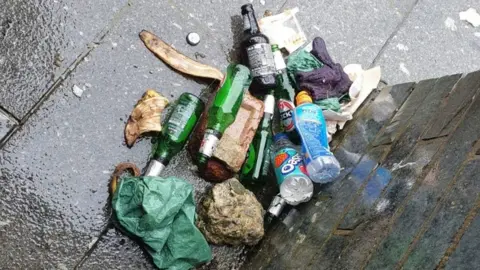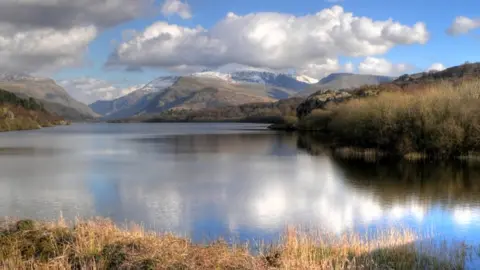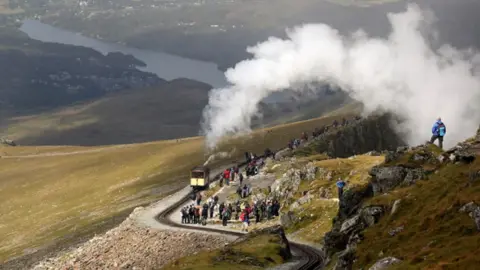Snowdon: Should hikers be charged for Wales' highest peak?
As more people lace up their hiking boots and head outdoors during lockdown, questions are being raised over who should pay to protect mountains for future generations.
Every year more than half a million people climb Snowdon, in Gwynedd.
But with record numbers flocking to the mountain in recent weeks there have been concerns over litter and parking.
Now a Gwynedd councillor wants visitors to be charged to go to the summit, to help pay for upkeep.
Landowners cannot charge for access to land, but can ask people to pay for facilities, like toilets, parking and attractions.
Ramblers Cymru said charging walkers would set a "dangerous precedent" and more should be done to actively promote other walking routes to stop overcrowding.
 Arwel Griffiths
Arwel GriffithsWhile the idea of charging visitors to Snowdon is not new, it has come to the forefront again after people reported a marked rise in visitors after coronavirus travel restrictions were eased.
The Snowdonia and Brecon Beacons national parks were closed at the start of lockdown, after "unprecedented" crowds flocked to Snowdon and Pen y Fan despite advice against non-essential travel.
Car parks and paths reopened in Snowdonia on 6 July to visitors for the first time after the "stay local" travel restrictions were lifted.
But since then there have been growing concerns about dangerous parking and litter, with some leaving wrappers, dog mess and human excrement behind.
 Stephen Elwyn Roddick / Geograph
Stephen Elwyn Roddick / GeographCurrently hikers can help pay for the upkeep of maintenance of mountain paths, by donating money at hotels or adding a donation to their bill.
But Gwynedd councillor Glyn Daniels wants the charge to be mandatory for all who go up the mountain, either by foot or taking the railway to the summit.
Mr Daniels, who represents the Diffwys and Maenofferen ward, said even charging as little as £1 a visitor would generate hundreds of thousands of pounds for maintenance of the paths.
"This would not only raise revenue for both the council and the park, but could also contribute to building new car parks," he told the Local Democracy Reporting Service.
Mr Daniels, who has submitted a motion to the council supporting a charge, repeated calls for a tourism tax to help boost the area and pay for repairs.
"When tens of thousands of tourists flock to our beauty spots, surely we should be able to benefit a little more financially," he added.
"We're not asking for gold nuggets, but then again we deserve more than peanuts."
 Getty Images
Getty Images'Promote more beautiful places'
Bran Devey, of the Ramblers' Association Cymru, said more needed to be done to promote other "stunning" walking routes to stop overcrowding at Snowdon.
"During lockdown a lot of people have been going out walking, and so as soon a the restrictions were lifted they wanted to go to the iconic spots," he said.
"Local people will not go up Snowdon really in the summer, it is too busy, there are areas that are quieter and even more stunning."
But he said introducing any charge could create inequality in access to routes and nature, and people should instead be educated to respect the countryside.
Diverting crowds could however raise issues in itself, creating other hotspots in areas without facilities, as Snowdon has marked paths, toilets, parking and a cafe.
Snowdonia National Park Authority, which manages the upkeep of the mountain, said it would "not be legal or enforceable to charge a toll" and national parks did not have tax raising powers.
"We do welcome the need for a national conversation about how we can continue to sustain and improve visitor management and infrastructure including parking and transport," a spokeswoman said.
"How this is sustainably funded into the future as visitor number continue to vastly increase is also a matter that needs to be debated."
